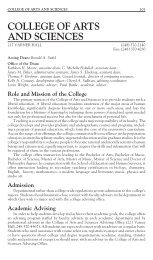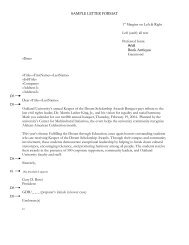MOM 2006 journal for pdf.pmd - University of Michigan-Flint
MOM 2006 journal for pdf.pmd - University of Michigan-Flint
MOM 2006 journal for pdf.pmd - University of Michigan-Flint
Create successful ePaper yourself
Turn your PDF publications into a flip-book with our unique Google optimized e-Paper software.
Many countries have taken Latin American telenovelas and adapted them to fit the local<br />
cultural norms. For instance, many countries purchase only a block <strong>of</strong> 40 episodes, which are<br />
edited down from the original 200 episodes that aired in series’ home country (Jaspar). There is<br />
also the issue <strong>of</strong> censorship in countries such as China, where editing must be done to change the<br />
content <strong>of</strong> the programs to meet government regulations. In a process called co-production, the<br />
Latin American production companies <strong>of</strong>ten work with local Chinese companies to facilitate the<br />
process and come up with a more authentic product (Jaspar). Another type <strong>of</strong> co-production,<br />
known as licensing, was used in India by Sony’s Hindi channel. A local version <strong>of</strong> Colombia’s<br />
“Betty la Fea” (“Betty the Ugly”) is seen in India using local talent and local adaptations on the<br />
original themes. Another example <strong>of</strong> licensing is the Russian “Poor Anastasia”, which was<br />
loosely based on “Betty la Fea” (Martinez).<br />
Telenovelas have a very strong influence on the people who watch them – a fact which can be<br />
considered positive or negative, depending on the cultural context. Paula Andaló explains:<br />
Telenovelas’ larger-than-life story lines may be exaggerated renditions <strong>of</strong><br />
real life dramas, but many viewers see their own lives reflected in those <strong>of</strong><br />
their favorite stars. They identify themselves and others they know with<br />
various characters and are drawn in by the compelling twists and turns <strong>of</strong><br />
overwrought plots. Thus, modeling a behavior they see on screen is<br />
almost natural.<br />
In recent years the production companies in Latin America realized that they could use this<br />
opportunity to promote social change to an already captive audience, leading them to insert<br />
messages about health, abuse, women’s issues, drugs, alcohol, AIDS, and trying to live a better<br />
life in general. Since many telenovelas deliver messages about sensitive topics, some countries<br />
find the material unsuitable <strong>for</strong> local viewers and must edit this content. Research conducted in<br />
Latin America, however, has shown that issues presented in telenovelas inspired people to make<br />
changes <strong>for</strong> the better in their lives. For example, in the Peruvian series “Simply Maria” a rural<br />
Peruvian women moves to the city and falls on hard times, finding herself betrayed by a lover<br />
who leaves her to raise their child alone. She turns her life around by overcoming obstacles such<br />
as illiteracy and lack <strong>of</strong> marketable skills by taking classes. Research conducted during this time<br />
reported a marked increase in the amount <strong>of</strong> sewing and literacy class enrollment as a result <strong>of</strong><br />
seeing how Maria was able to improve her life situation (Andaló).<br />
Analysis <strong>of</strong> Theoretical Models <strong>of</strong> Cultural Globalization<br />
The concept <strong>of</strong> cultural imperialism is described as a type <strong>of</strong> cultural domination by powerful<br />
nations over weaker ones. Because Latin America is considered a developing region, the<br />
dissemination <strong>of</strong> its popular culture on such a grand scale isn’t <strong>of</strong>ten described as being<br />
“imperialistic” or “dominant”. However, telenovelas are becoming so popular and influential<br />
worldwide that they are being banned, adapted, or emulated by local production institutions.<br />
Their success shows us that globalization has a “back channel”, where there is room <strong>for</strong> surprise<br />
in a world dominated by the American entertainment industry (Martinez). This success has been<br />
called “reverse cultural imperialism”, or more humorously, “Montezuma’s revenge” (Martinez).<br />
Meeting <strong>of</strong> Minds <strong>2006</strong> 95
















